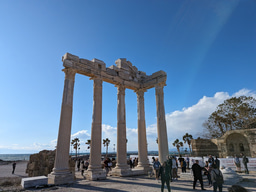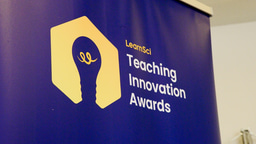Online teaching and Aristotle’s pillars of rhetoric

The coronavirus crisis has forced a fast transition to online teaching in schools and universities worldwide. And most teachers and professors have had to quickly learn modern teaching technologies and innovative methods.
We can appreciate the great advantages of “virtual classrooms” versus “physical classrooms”, e.g. flexibility and comfort for the students, lower costs for both the student and the educational system, lower pollution in large cities, etc. But we also are all aware of their many other disadvantages, e.g. lack of accreditation, discipline, interaction, etc. A particular aspect not sufficiently explored is the effect of prolonged or intense virtual teaching on students' personal development, in particular on their social skills and emotional intelligence. Having children and young students at home, days and weeks isolated in a bedroom yet communicating with teachers and colleagues through a personal computer, is surely not the best way to help their social relationships mature and their welfare.
Working at home for several weeks because of the pandemic, I personally have had the experience, for first time in my academic life, of teaching online every day to my students at the School of Biology, University of Seville. And I have had the opportunity to personally confirm the pros and cons of online teaching above mentioned. One of the major difficulties in the “classical lecture” format is to get the students to interrupt the explanation to ask any question and, in general, interact with the professor and the other students. Such a difficulty is much higher in online teaching. An interesting, novel alternative is the “flipped classroom design”, in which the course material is introduced at home and the students further gain practice and learn in-class by applying previously gained knowledge to solve any particular problem. Flipped learning could thus be a way to mitigate in part the reduced online teacher–student interaction.
In any case, speaking to a computer is not, in my opinion, a pleasant experience, in particular because the teacher never knows whether their students are following the lesson with interest or having a coffee in the kitchen, or both. But even worse is the almost total loss of face-to-face communication in online teaching, not only of the teacher with the students but also among the students themselves.
This reminds me of Aristotle’s three pillars of rhetoric or communication: ethos, logos and pathos. Ethos refers to the authority and credibility of the speaker, i.e. their knowledge on the matter. Logos stands for the logical reasoning used by the speaker to support their authority. And pathos refers to empathy, i.e. the ability of the speaker to transmit their own emotions to the audience. And it is evident that pathos–empathy is almost null in virtual classes, so the third key pillar is completely missing.
But ethos–authority is indeed a serious deficit in teachers in the modern educational system. Aristotle – like all ancient Greek philosophers – spent most time in thinking and developing novel ideas, without caring too much about communication tools. Current teachers, by contrast, spend much of their time in learning novel teaching methodologies rather than in generating knowledge. The traditional academicians created new knowledge; many modern professors learn others’ knowledge. Deductive reasoning then leads to a provocative conclusion: the traditional academicians transmitted their own knowledge – their classes were unique as nobody else could replace them; however, any modern professors transmit others’ discoveries and anyone else could thus replace them.
The old “master–disciple” relation typical in Greece and Rome was based on a teacher’s auctoritas, but the currently predominant “professor–student” relation is mainly based on a teacher’s potestas. In Ancient Rome, auctoritas referred to power based on personal prestige, whereas potestas referred to power based on legal office; auctoritas referred to socially recognized knowledge, while potestas referred to socially recognized power.
Coda:
In teaching in either a physical or a virtual classroom, the university teacher should try to reach a right balance between content and form – between time spent in studying and thinking (content) and the time spent in learning novel teaching methodologies (form). But this is an even more difficult achievement in virtual classrooms, where the teacher has the risk of getting lost in modern technologies and forgetting about the subject.
Open discussion:
- On pathos–empathy: How to manage teacher–student interaction in virtual classrooms?
- On ethos–authority: How to recover the master–disciple relation based on teacher’s auctoritas?
Top image of post: by Manfred Steger/Pixabay





Join the FEBS Network today
Joining the FEBS Network’s molecular life sciences community enables you to access special content on the site, present your profile, 'follow' contributors, 'comment' on and 'like' content, post your own content, and set up a tailored email digest for updates.
Thanks a lot, Miguel, it speaks from my heart. The future of all teaching shall not be far-distance telecourses. Too much is missing!
Thanks Miguel for this eye-opening and provocative (in the best way) post!
I agree with a majority (if not all) of your opinions and to confess, I also had similar experiences. I could add that most of the time, we do not miss only teacher-student interaction but also student-student interaction in virtual classes.
For the pathos-empathy discussion, your suggestion of the flipped class technique is one of the best ideas. By this way, the classical learning part can be 'at home' (asynchronous most of the time), and the '-ahhhaaa moments' (as Eric Mazur calls them) can take place 'in the virtual classroom' (synchronous most of the time). But for this, much more than in a face-to-face class, the teacher needs to plan ahead for each task and think about how the students can interact.
That being said, I believe the interaction in a virtual classroom will depend on the instructor’s teaching style (e.g., direct instruction, break-out rooms, moderated discussions) and the different interaction methods (e.g., audio, polls, text chat, feedbacks) as in real classrooms.
It is clear that virtual learning is our only option right now and we should make the most of it. What is not clear is if the virtual learning will replace the traditional teaching.
My opinion is that both forms of teaching-learning have their own importance.
My hope is, based on our experiences today, teachers will make the best use of both forms in a blended way in the future.
Thanks again for this great post!
Thanks to you both, Ferhan and Andreas. It’s good to know you agree with most comments at the post.
You suggest a “blended way in the future”. Maybe we are living a kairos, i.e. facing an educational challenge. Kairos is an ancient Greek word meaning the right or opportune moment in time to change things. Is the current pandemic a kairos for changing the educational model? Should the classical textbooks be replaced by video lectures?
This would mean to have just a few superb lecturers in each language who record say first-year undergraduate biochemistry content that is used by everyone else. Should thus the predominant teaching format in the future be based on the flipped class, with students attending online video lectures at home and physical questions/answers classes at the university or school?
Thank you Miguel for your excellent post on a very sensitive topic not only for the University teachers like us. Just few days ago I posted on facebook the following sentence : "It seems to me that we are exaggerating with all these meetings, seminars, debates, workshops, courses, exams etc etc .... online. I wish to come back, as soon as possible, at talks looking at each other, at shaking our hands and embracing each other". I'm afraid that pandemic may change permanently our behaviors and communicating practices. Such as algorithms are changing, excessively semplifying, the evaluations, or polls are too much conditioning our political choices, virtual teaching and, in general, online communication may reduce the space of participation, limit the relationships and, at the end, the democracy system. Thank you to have called Aristotele as a friendly aid to remember to all of us the main three principles: "logos, ethos and pathos".
TjThanks Miguel A, food for thought! ... there is no doubt that many activities will change and we will learn that they can be done remotely. But undoubtedly, personal interaction increases communication and creativity, activates more brain areas. We should also fight not to lose our most human side as we walk this new path.